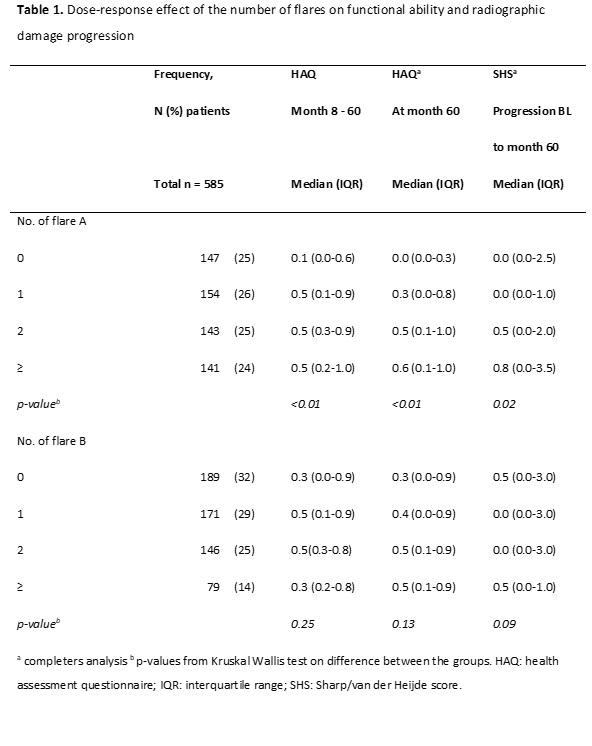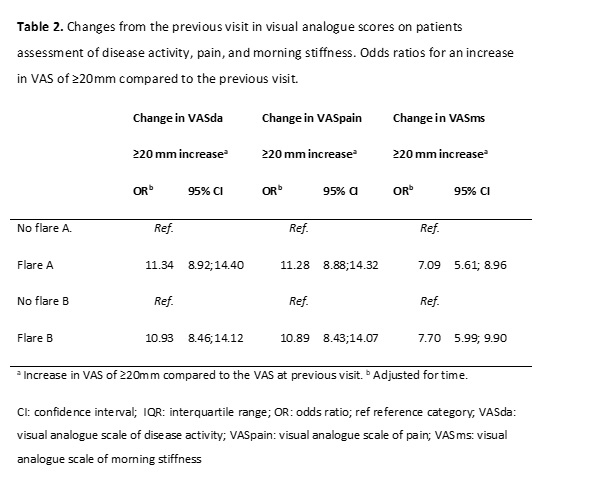Session Information
Date: Sunday, November 7, 2021
Title: RA – Diagnosis, Manifestations, & Outcomes Poster II: Miscellaneous Aspects of RA (0786–0812)
Session Type: Poster Session B
Session Time: 8:30AM-10:30AM
Background/Purpose: There are many definitions of flare in rheumatoid arthritis (RA). Loss of low disease activity is associated with clinically relevant deterioration. Patients in DAS remission may flare to DAS≥1.6 but still have low disease activity. How does this affect outcomes? Therefore the objective of this study was to evaluate the prevalence of disease flares in patients treated to target DAS < 1.6, and to study the impact on clinical and patient-reported outcomes (PROs).
Methods: In the IMPROVED study 610 patients with early RA or UA were treated to target DAS< 1.6 for 5 years. Flares were defined as; A) DAS≥1.6 regardless of the previous DAS and ≥0.6 increase; B) DAS≥1.6 and previous DAS< 1.6 with ≥0.6increase. Kruskal Wallis tests were used to compare mean HAQ over time, HAQ at 5y, and median SHS progression at 5y between patients with different no. of flares. The OR for a significant deterioration of ≥20mm (from the preceding visit) on a visual analogue score (VAS) for disease activity, pain and morning stiffness during flares were calculated using a generalized linear mixed model.
Results: Over time 75% of patients had ≥1 flare A, and 68% ≥1 flare B. In 55% and 69% of cases, respectively, DAS remained ≤2.4. In 55% of flares A and B, a clinically relevant increase in HAQ of ≥0.22 occurred. This significantly (p< 0.01) increased to 68% in flares A and 76% in flares B if the DAS had increased to ≥2.4. More flares A per person were associated with a higher mean HAQ over-time and at 60 months and SHS progression at 5y (table 1). Also for the patient reported outcomes, there was a significant risk for a >20 mm deterioration (ORs ≥1 with 90% confidence intervals exceeding 1) for flares A and B (table 2).
Conclusion: In most patients, significant deterioration in PROs occurred when DAS increased to >1.6, even if DAS remained ≤2.4. Regardless of previous DAS, an increase in ≥0.6 DAS points was clinically relevant. Cumulative flares were associated with loss of and radiological progression at 5 years.
To cite this abstract in AMA style:
Maassen J, Bergstra S, de Buck P, van Oosterhout M, Allaart C, Huizinga T. The Impact of Flares on Clinical and Patient Reported Outcomes in Rheumatoid and Undifferentiated Arthritis Patients [abstract]. Arthritis Rheumatol. 2021; 73 (suppl 9). https://acrabstracts.org/abstract/the-impact-of-flares-on-clinical-and-patient-reported-outcomes-in-rheumatoid-and-undifferentiated-arthritis-patients/. Accessed .« Back to ACR Convergence 2021
ACR Meeting Abstracts - https://acrabstracts.org/abstract/the-impact-of-flares-on-clinical-and-patient-reported-outcomes-in-rheumatoid-and-undifferentiated-arthritis-patients/


